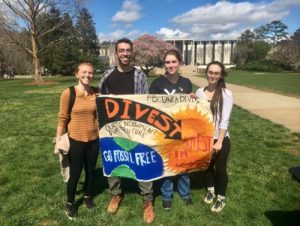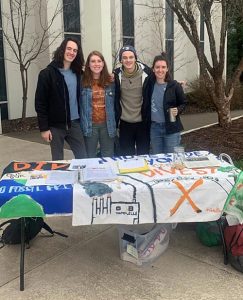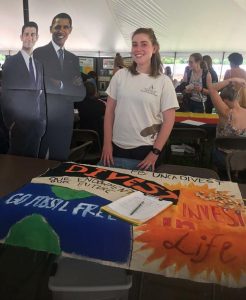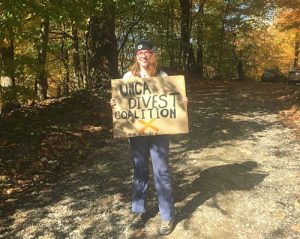College and University Divestment Campaigns: Organizing and What to Expect on Your Campus
College and university divestment campaigns tend to conjure up images of radical student groups organizing direct actions. Yet campaigns have multiple tactics and tools in their boxes. Here are some that worked in North Carolina — and might work for you once campuses are able to safely reopen.
 Keep in mind that there are multiple moving pieces and bureaucracy that make campus divestment campaigns unique with a different strategy needed for each school. Students and student leaders eventually graduate, leading to frequent turnover that will take significant time for recruitment, replacement and training. Each campus also has its own set of bureaucratic rules and regulations. They become more complex the bigger the school, and even more so if the college or university is part of a wider system. This often results in internal campus systems and bureaucracies quite resistant to change. Particularly resistant schools might be even more aggressive in discouraging students, for example, by monitoring student communications and discouraging gatherings. Every campus culture is unique; so, too, will be their reaction to your campaign. Create a carefully-designed strategy that fits your campus culture.
Keep in mind that there are multiple moving pieces and bureaucracy that make campus divestment campaigns unique with a different strategy needed for each school. Students and student leaders eventually graduate, leading to frequent turnover that will take significant time for recruitment, replacement and training. Each campus also has its own set of bureaucratic rules and regulations. They become more complex the bigger the school, and even more so if the college or university is part of a wider system. This often results in internal campus systems and bureaucracies quite resistant to change. Particularly resistant schools might be even more aggressive in discouraging students, for example, by monitoring student communications and discouraging gatherings. Every campus culture is unique; so, too, will be their reaction to your campaign. Create a carefully-designed strategy that fits your campus culture.
Divestment in North Carolina
 As a student organizer at the University of North Carolina Asheville, involved with this effort for over two years, I can attest to the complexity, but successful outcomes, of a few of these struggles. You can dive deeper into the history of the UNCA Divest Coalition here. I am really proud to be part of this inspiring group that has established a legacy of dedicated and passionate students and has passed the torch for over six years, eventually leading to the successful partial divestment of the university’s endowment last summer. This successful first step towards our end goal of total divestment was largely due to the initial openness of our administration, which is now very supportive of our initiative, although at first, they were not. Unlike the experience of many campus campaigns, our administration from the start was at least willing to engage with students, rather than dismiss them. They worked with us on the processes necessary to bring along the many bureaucratic players to get us to where we are now. From my understanding, this is not common for many campaigns at all. But this has been the atmosphere in which I have been engaged in and can best speak to. So, looking to engage in discussion with an administration, though undramatic, can lead to the critical step of coalition building across the entire campus community.
As a student organizer at the University of North Carolina Asheville, involved with this effort for over two years, I can attest to the complexity, but successful outcomes, of a few of these struggles. You can dive deeper into the history of the UNCA Divest Coalition here. I am really proud to be part of this inspiring group that has established a legacy of dedicated and passionate students and has passed the torch for over six years, eventually leading to the successful partial divestment of the university’s endowment last summer. This successful first step towards our end goal of total divestment was largely due to the initial openness of our administration, which is now very supportive of our initiative, although at first, they were not. Unlike the experience of many campus campaigns, our administration from the start was at least willing to engage with students, rather than dismiss them. They worked with us on the processes necessary to bring along the many bureaucratic players to get us to where we are now. From my understanding, this is not common for many campaigns at all. But this has been the atmosphere in which I have been engaged in and can best speak to. So, looking to engage in discussion with an administration, though undramatic, can lead to the critical step of coalition building across the entire campus community.
 There’s also something really important to be said for the idea of campus coalition building in bringing in and uplifting the voices and experiences of those most marginalized and affected by climate change — typically poor, black, brown, indigenous, and LGBTQIA+ folks. I’ve watched the movement towards climate action begin to shift to be more inclusive and intersectional, aiming to focus more on frontline and marginalized folks around the world hit hardest by inequality and environmental injustice. I have found this change to be empowering, beautiful, and encouraging, while expanding the size and power of divestment campaigns. To be successful, we have the capacity and even the obligation, to coalesce with other student organizations on campus who represent these groups.
There’s also something really important to be said for the idea of campus coalition building in bringing in and uplifting the voices and experiences of those most marginalized and affected by climate change — typically poor, black, brown, indigenous, and LGBTQIA+ folks. I’ve watched the movement towards climate action begin to shift to be more inclusive and intersectional, aiming to focus more on frontline and marginalized folks around the world hit hardest by inequality and environmental injustice. I have found this change to be empowering, beautiful, and encouraging, while expanding the size and power of divestment campaigns. To be successful, we have the capacity and even the obligation, to coalesce with other student organizations on campus who represent these groups.
Know your friends
 Our friends at other UNC system institutions have all had their own experiences — successes and failures. That is part of what brought us together to form the NC Reinvest Coalition, a tight-knit affinity group organizing across the state to divest the entire UNC-system, composed of 17 institutions and holding over $5.2 billion in assets. There are divestment coalitions forming across campuses, states, and beyond; I have found that bringing in a broad range of backgrounds, experiences and strengths to unite over a common goal, and sometimes a common challenge, is an extremely powerful organizing strategy.
Our friends at other UNC system institutions have all had their own experiences — successes and failures. That is part of what brought us together to form the NC Reinvest Coalition, a tight-knit affinity group organizing across the state to divest the entire UNC-system, composed of 17 institutions and holding over $5.2 billion in assets. There are divestment coalitions forming across campuses, states, and beyond; I have found that bringing in a broad range of backgrounds, experiences and strengths to unite over a common goal, and sometimes a common challenge, is an extremely powerful organizing strategy.
Know your challenges
 Each campus comes with their own set of challenges. For example, the UNC System and the boards that govern it are heavily politicized. The UNC Chapel Hill-based Board of Governors, for example, is appointed by the reactionary North Carolina legislature. UNC Chapel Hill students have historically been met with militarized police and a far less supportive administration when it comes to student action, as evidenced by the Silent Sam protests in 2017. The North Carolina State University campaign has also struggled with building relationships with their administration. Being part of the UNC-System has also posed unique barriers, one of which we were met with last summer after the Board of Trustees at UNC Asheville passed a resolution calling for 10% of the endowment to be divested. Soon after the meeting, several conservative think tanks, including the James G. Martin Center, which asserted that UNC Asheville was violating institutional neutrality, a university statute of free speech, by taking a political stance on climate change and the fossil fuel industry. They claimed that, under the legislation, the university’s action was illegal. After legal advice and working with the administration, UNC Asheville determined that this claim has no legal backing. Since the commitment to partial divestment has not received pushback from the Board of Governors that oversees the whole UNC System, we will move forward. All of this to say that these were some of the recent challenges we’ve overcome in North Carolina, and it truly varies by campus and state.
Each campus comes with their own set of challenges. For example, the UNC System and the boards that govern it are heavily politicized. The UNC Chapel Hill-based Board of Governors, for example, is appointed by the reactionary North Carolina legislature. UNC Chapel Hill students have historically been met with militarized police and a far less supportive administration when it comes to student action, as evidenced by the Silent Sam protests in 2017. The North Carolina State University campaign has also struggled with building relationships with their administration. Being part of the UNC-System has also posed unique barriers, one of which we were met with last summer after the Board of Trustees at UNC Asheville passed a resolution calling for 10% of the endowment to be divested. Soon after the meeting, several conservative think tanks, including the James G. Martin Center, which asserted that UNC Asheville was violating institutional neutrality, a university statute of free speech, by taking a political stance on climate change and the fossil fuel industry. They claimed that, under the legislation, the university’s action was illegal. After legal advice and working with the administration, UNC Asheville determined that this claim has no legal backing. Since the commitment to partial divestment has not received pushback from the Board of Governors that oversees the whole UNC System, we will move forward. All of this to say that these were some of the recent challenges we’ve overcome in North Carolina, and it truly varies by campus and state.
Time to act
Divestment is one of the most powerful tools that students have to push their campuses to engage in the climate crisis. While we found success at UNC Asheville, the strategy you use at your school might look quite different. Whatever your path looks like, it’s important to keep in mind all of the tools in your organizing chest and remember the power that we have as students.
 —Kelsey Hall, Rachel Carson Council Fellow, UNCA. Kelsey Hall is an Environmental Policy and Management major at the University of North Carolina-Asheville with minors in Economics and Human Rights Studies. [email protected]
—Kelsey Hall, Rachel Carson Council Fellow, UNCA. Kelsey Hall is an Environmental Policy and Management major at the University of North Carolina-Asheville with minors in Economics and Human Rights Studies. [email protected]






